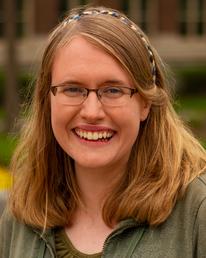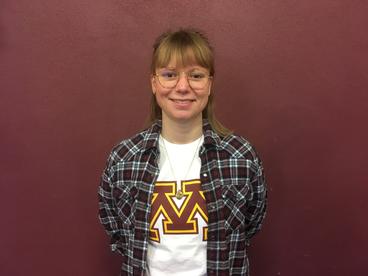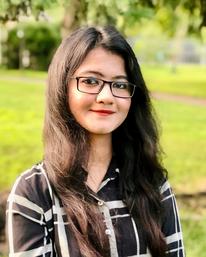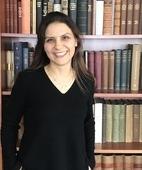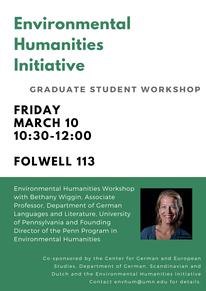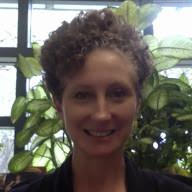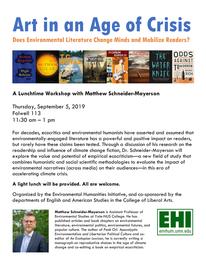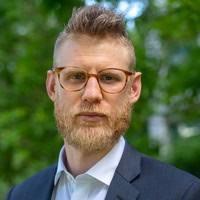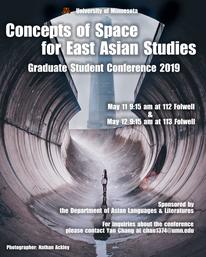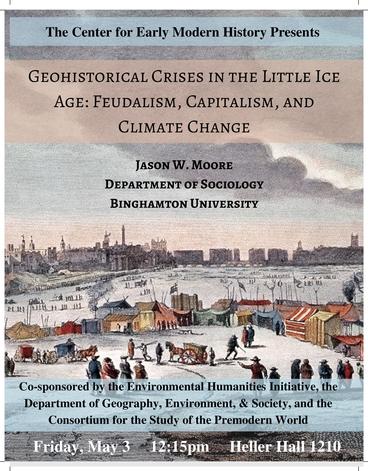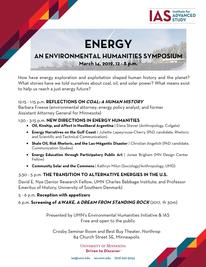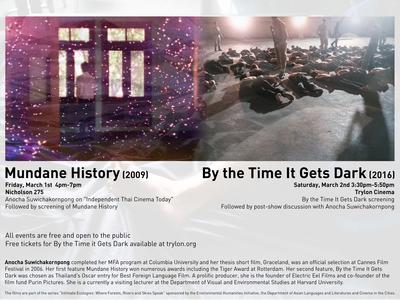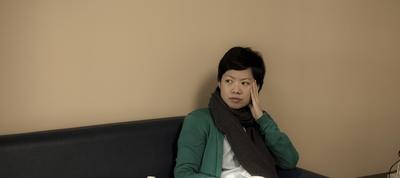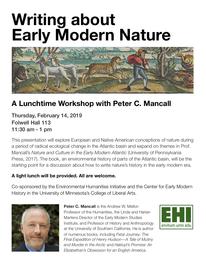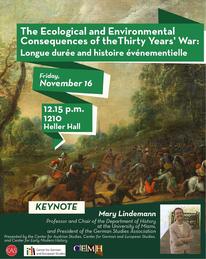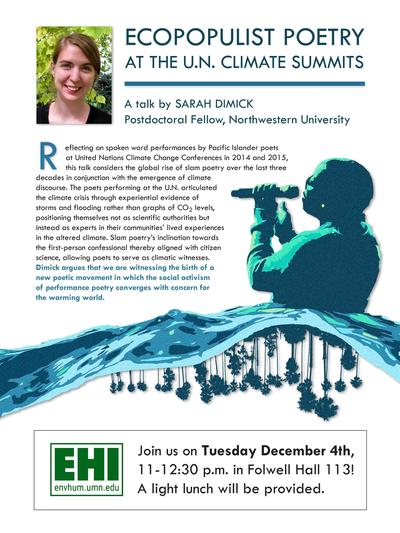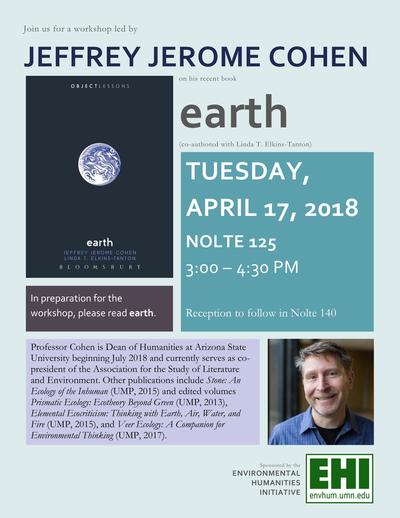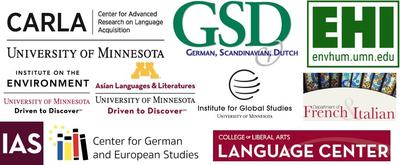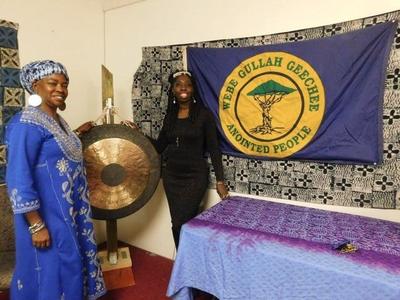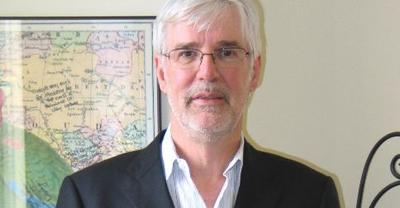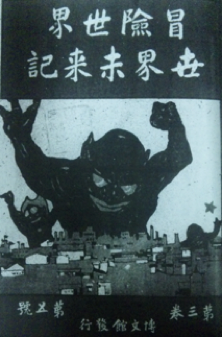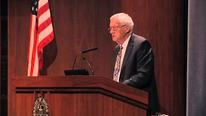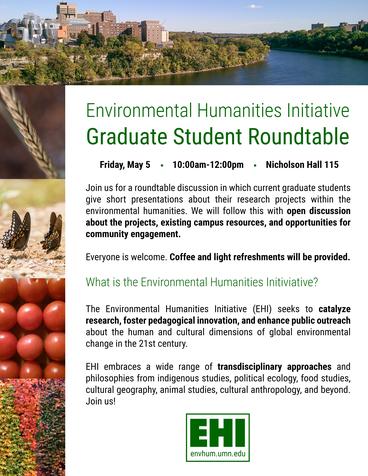2021-2022
Island/Archipelagic Studies in a Land of 10,000 Lakes: A Graduate Student Zoom Panel from AMST 8920: Archipelagic American Studies
Spring 2022
Join us on Wednesday, April 27 from 4:00 - 5:30 p.m. for a graduate zoom student panel sponsored by the Environmental Humanities Initiative and the Department of American Studies. The panel will be moderated by Professor Kale B. Fajardo of the Department of American Studies and Asian American Studies at the University of Minnesota. See below for presenters, bios, and paper abstracts. (Zoom Link, passcode Gb6vNi)
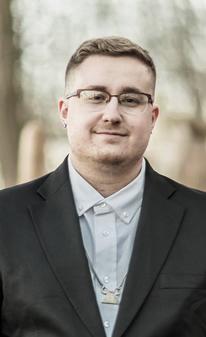
Alex Hopp (he/him/his) is a second-year Ph.D. student in the History Department at UMN-TC studying under Dr. Mai Na Lee. His dissertation research centers on histories of the Hmong diaspora and Southeast Asian refugee resettlement in the United States. When not occupied by his studies, he spends his time working and volunteering with DREAMers of Wisconsin and the PEOPLE program at UW-Madison, working to reduce educational disparities for underserved high school and college students in his home state.
Title: “Towards an Archipelagic Hmong American Critique: Island Studies, Critical Refugee Studies, and the Ecological Destruction of Empire”
Abstract: The burgeoning field of critical refugee studies has conceptualized the figure of the refugee as an embodied critique of imperialism and its attendant violences. Often focused on illuminating structures of war, displacement, and racialization, another crucial component and aftereffect of imperial violence–environmental degradation–has flown under the radar. For Hmong refugees resettled in the United States, however, environmental destruction has served as a constituent part of their understanding of the violence of displacement. Importantly, this sort of violence is not always immediately apparent, hidden under the overlapping layers of destruction that compose Hmong refugee history. Nevertheless, the fields of Island Studies and Archipelagic American Studies, already concerned with the environmental impacts of imperialism, offer crucial frameworks that render this critique of empire legible. Thus, in thinking through Hmong America as an archipelago, this paper will seek to demonstrate how Hmong understandings of refugee resettlement in the United States offer a critique of environmental degradation that would otherwise remain opaque.
Lindsey Smaka (she/her/hers) is a third-year doctoral student in the Department of Comparative and International Development Education at UMN-TC. Along with being a Ph.D. student, she teaches chemistry and coordinates the Global Scholar Program at Edina High School in Edina, Minnesota. Her passion for global and international education was sparked by her experience as a Fulbright Fellow in Morocco in 2019 where she researched the language of instruction in science education. Lindsey coordinates science student travel, specifically environmental conservation research while connecting students to Indigenous communities with their fieldwork. She has led student conservation research expeditions to South Africa (2017), Fiji (2018), and Ecuador (2019). Lindsey is also a National Geographic Certified Educator and is a part of the Rotary Club of Edina. She volunteers in many capacities through the Rotary, including coordinating and running the Rotary-sponsored Global Scholar Program, participating in a service expedition to Guatemala, and taking part in both the International Grants and Diversity and Equity Committees. She was named Edina’s 2021 Rotarian of the Year. Lindsey plans to research construction of student conservation knowledge and how students merge western science with Indigenous and local knowledge systems while in an immersive travel experience.
Title: “From Minnesota to Madagascar: Reimagining Ecological Conservation Pedagogy through Indigenous Island Roots”
Abstract: This paper explores how the colonial history and geographical placement of Madagascar have affected both the islandness of its local people and conservation efforts. I am arguing that it is essential to look at its people's indigenous island knowledge as conservation research continues in Madagascar particularly because this research is a part of my broader efforts as a secondary science educator. This paper outlines crucial Indigenous knowledge that I intend to engage with and teach global north secondary students about during my proposed dissertation research in Madagascar in 2023. Madagascar is a unique island to study as it is oftentimes overlooked as an island because of its size and tends to be caught in the middle of belonging to Africa and the Indian Ocean world and as a result can be forgotten. With Madagascar's unique history and location on the globe as an archipelagic nation, conservation efforts in this country are critical as the globe dangerously approaches the 1.5 celsius global warming threshold. It is essential to look to its peoples' Indigenous island knowledges as conservation research continues in Madagascar.

Eunice Kim (she/they) is a graduate student in the University of Minnesota’s History department. She researches transpacific migration in the latter half of the 20th century, with a focus on the interactions between the refugees and the Asian im/migrant communities that existed around the U.S. military bases in Busan, Guåhan, and Hawaiʻi.
Title: “‘Containing’ the evacuees from Vietnam on an Island: Operation New Life on Guåhan in 1975”
Abstract: More than 110,000 evacuees from Vietnam arrived in Guam through Operation New Life in 1975. As the evacuees waited to be processed for entry into the United States or another country, their number in the “Tent City” during May 1975 outnumbered the Guam residents and sometimes sparked an anti-refugee and anti-immigrant sentiment. This research attempts to look deeper under that reactionary surface and analyze the public discussion around availability of clean water, military’s control of lands and roads, and medical screening and vaccination process. I argue that this point in history reveals a complicated legacy of racism, settler colonialism, and medical humanitarianism that aided and justified the expansion of the US military as well as its immigration regime rooted in exclusion. This paper also presents primary sources that discuss potential resettlement of Vietnamese evacuees to Pacific Islands.
Dialogues in the Environmental Humanities - A Virtual Seminar Series
Spring 2022
On March 25 from 1:30 - 3:00 pm, join us for “Dialogues in the Environmental Humanities: A Conversation with 2021-2022 EHI Graduate Fellows.”
Zoom link, passcode: z6ZaPe
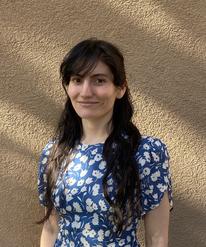
Carlie Cervantes de Blois, PhD candidate in the History of Science, Technology, and Medicine, will be speaking on “Damming Indonesia to Modernity: Considerations of Water in Agricultural Development.” The literature of the Green Revolution in Asia has established that the Green Revolution in Asia increased overall rice yield but also left ecological and economic challenges for local farmers in the name of modernity; however, often overlooked is the role of local water systems in development plans. By examining two dams in Indonesia, I argue that dam development and water management was critical to Indonesia’s goals of progress in the 20th century.
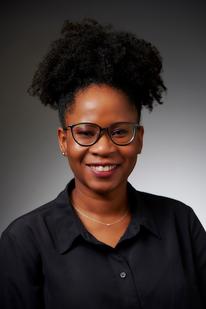
Ntombi Mpofu, PhD candidate in History, will be speaking on “Emalahleni ‘place of coal’: A history of water scarcity and electricity production.” The introduction of electricity in South Africa in the late 1800s led to the foundation of coal mining towns like Emalahleni, which contained racialized enclaves populated by poor and black people vulnerable to water scarcity and pollution. Due to the importance of electricity to the country’s economy and the high demand for water in electricity production, the activities of industrial water users like the Electricity Supply Commission (Eskom) and coal mines have historically contributed to water pollution and scarcity. In post-apartheid South Africa, the persistence of scarcity and pollution is sustained under the National Water Act of 1998, which allocated the electricity production industry a position of strategic water user, this designation legally underwrites, protects, and privileges industrial water usage to the detriment of human consumption. Using Emalahleni as a case study, I examine and respond to South Africa’s current and impending water crises by investigating the role played by the electricity industry in perpetuating these historical water challenges. I argue that colonial and apartheid legislative systems have endured well into the current legal system and continue to contribute to the water crises faced by vulnerable communities. Centering scarcity and demonstrating the intertwined relationship between water and energy production is key to understanding water history in South Africa. While scarcity dominates debates about water history in South Africa, it is often explained as a natural phenomenon. I argue the opposite, suggesting scarcity as a product of the colonial project, and the state’s modernization projects. In the process of making an industrialized nation, the South African state produces scarcity, which affects the poor, and black communities adversely and singularly.
Jack Halberstam on Wild Things: The Disorder of Desire
Fall 2021
EHI is pleased to co-sponsor a talk by Jack Halberstam on Wild Things: The Disorder of Desire (Duke, 2020), which offers an alternative history of sexuality by tracing the ways in which wildness has been associated with queerness and queer bodies throughout the twentieth century. The talk will be held on Wednesday, October 13 at 5pm on Zoom. Halberstam is Professor of English and Comparative Literature and Director of the Institute for Research on Women, Gender and Sexuality at Columbia University, as well as a UMN graduate (Ph.D. in English Literature, 1991). This event is presented by the Department of American Studies and is co-sponsored by the departments of English and GWSS, and the Center for RIDGS. (Register for the Zoom event here.)
Contemporary Developments in the Environmental Humanities: 2021 Transatlantic Conversations Series
Fall 2021
Join EHI co-organizer Dan Philippon for "Contemporary Developments in the Environmental Humanities," a panel conversation which will consider current perspectives on ecocriticism and the environmental humanities through an interdisciplinary and comparative lens. Dan Philippon will be joined by co-panelist Alexa Weik von Mossner from the University of Klagenfurt. The conversation will be moderated by David Clay Large, IES Senior Fellow and Associate Director of the UC Berkeley Austrian Studies Program.
This event is co-sponsored by the Office of Science and Technology Austria (OSTA), Washington DC and the Center for Austrian Studies. It will take place on Wednesday, October 6 at 12 pm CST. (Watch the event recording here.)
2020-2021
Online Conference: Toward a New Way of Being with Plants
April 21, 2021
This free two-day online event will explore human/plant connections, including ethics in human treatment of plants, plant sentience and communication, and opportunities for developing more respectful and reciprocal relationships between humans and plants.
The goals of this conference are to:
-
inspire people to change the ways in which they think about, interact with, and utilize plants so that their actions will be more respectful toward and collaborative with plants
-
advance the perspective that plants are much more complex, sentient, and intelligent than is commonly acknowledged
-
provide a forum for Indigenous and other perspectives that promote more respectful ways of relating with plants
-
help to connect people who are interested in working for more respectful treatment of plants
-
encourage and support the development of a network seeking to increase respectful treatment of plants that will continue after the event
-
inspire and encourage scholarly emphasis on plant-human relationships
Visit the conference agenda (with links) here. Visit the conference website here or register here.
Artwork courtesy of Zachari Logan. Detail image of a portion of Esta Selva Selvaggia, No. 2, pastel on black paper, 47 x 94 inches, 2019.
Dialogues in the Environmental Humanities - A Virtual Seminar Series
Spring 2021
Join us for "Hyperobjects: An EHI Interview and Q&A with Timothy Morton" on Friday, February 26 from 2pm - 3:30pm (Zoom link). Host Dr. Mark Pedelty will kick off the event in conversation with Dr. Morton before opening up to an interactive Q&A with the audience.
Missed the conversation? Listen to it here on the Public Lands Podcast.
Join us for "Dialogues in the Environmental Humanities: A Conversation with EHI graduate fellow Chris Bowman" on Friday, March 12 from 1:30 - 3pm (Zoom link, passcode: 0Vk6QE).
Join us for "Environmental Storytelling" with authors Kendra Atleework and Clare Boerigter on Friday, March 26 from 2pm - 3:30pm (Zoom link, password DKKbM0). In Miracle Country, Kendra blends family memoir with a rich environmental history of her California home-place. In her work for the Cloquet Forestry Center (CFC), Clare enlivens science and history through storytelling. Explore Clare's work for the CFC, including a multimedia piece on old-growth red pines and a historical collection of life at the Center.
EHI Animality Studies Reading Group
October 14, 2020
EHI invites participants to our Animality Studies reading group.
On October 30, 1:30pm-2:45pm, we will discuss the dystopian novel Tender is the Flesh by Argentinian author Augustina Bazterrica. This dystopian novel imagines a world where the raising of humans for consumption is normalized after animals have been wiped out by a global epidemic.
Zoom ID: 489 599 9888
Passcode: &6H59j
Dialogues in the Environmental Humanities - A Virtual Seminar Series
Fall 2020
EHI will be holding a virtual seminar series via Zoom from 1:30-3:00pm on Oct. 2, Oct. 9 & Oct. 16.
On Friday, Oct. 2, Kathleen Ibe and Jennifer Carnell from the Department of German, Nordic, Slavic & Dutch will share work originally scheduled for the German Studies Association Conference (now becoming virtual). Kathleen Ibe’s topic is “The Agency of Radioactive Particle Radiation in Christa Wolf’s Störfall: Nachrichten eines Tages.” Jennifer Carnell’s paper is “The Ravages of Time: A Premodern German Adaptation of Ovid’s The Metamorphoses.”
Zoom link: https://umn.zoom.us/j/96349860862?pwd=RDVwL0VFQTdVYllWWjhQZzd0c3M0Zz09
Meeting ID: 963 4986 0862
Password: disseminated to EHI listserv prior to event. Not on the listserv? Click here to join.
On Friday, Oct. 9, EHI Graduate Fellows Sreyashi Ray and Thomas Seweid-DeAngelis will discuss the relevance of animality studies for political and cultural theory, moderated by Christine Marran. Sreyashi Ray is a PhD candidate in the Department of Asian and Middle Eastern Studies. Thomas Seweid-DeAngelis is a graduate student in the Department of American Studies. Christine L Marran is Chair for the Department of Asian and Middle Eastern Studies.
Zoom link: https://umn.zoom.us/j/91014932335?pwd=Y3lua0V1bnpGZ1hKTkloM0lGOFk4UT09
Meeting ID: 910 1493 2335
Password: disseminated to EHI listserv prior to event. Not on the listserv? Click here to join.
On Friday, Oct. 16, Zozan Pehlivan of the History Department will discuss weather anomalies and global climatic shifts as they relate to El Niño Southern Oscillation and North Atlantic Oscillation in the 19th century Middle East. This rescheduled talk was originally slated for Spring 2020.
Zoom link: https://umn.zoom.us/j/94916559129?pwd=SzJoUnZaUk02d2VDM29FcUFWdldMZz09
Meeting ID: 949 1655 9129
Password: disseminated to EHI listserv prior to event. Not on the listserv? Click here to join.
2019-2020
Graduate Syllabus & Professional Development Workshop
February 28, 2020
Mark Pedelty (Communication Studies), Dan Philippon (English), Charlotte Mellin (German) and recent U of MN graduate Juliette Lapeyrouse-Cherry (Writing Studies) will present their syllabi and lead an informal discussion about objectives, assignments, and core readings for environmentally themed courses.
PLUS, EHI will share some exciting news at the workshop about EHI’s Interdisciplinary Dissertation Fellowship sponsorships and funding opportunities for EHI grads to present their research on other campuses.
Forced Migration + Climate Crisis
December 4, 2019
Professor Christine Marran (Chair of Asian + Middle Eastern Studies Department and Co-Convener of the Environmental Humanities Initiative) and I (Kale Fajardo, Asian American Studies + American Studies + Coordinator of the Asian Studies + Environmental Humanities (ASEH) Research Cluster are speaking on a panel on “Forced Migration and the Climate Crisis,” along with the Executive Director of the International Institute of Minnesota.
The Human Rights Student Association organized this event and they will serve Somali food.
DATE: Wed, December 4th
TIME: 6-7:30
LOCATION: Burton 123
Ecocriticism, Community Engagement, and the Future of German Studies: A Symposium
November 1, 2019
Contemporary environmental challenges ranging from climate change and biodiversity loss to social justice issues have accelerated the interdisciplinary turn in German studies toward the environmental humanities. This interest has catalyzed the work of scholars in many domains and motivated the development of innovative creative approaches to curriculum design. It has also raised awareness of the need for collaborative efforts and community connections. This symposium will explore the intersection of German studies with environmental humanities in terms of scholarship, curriculum, and community, with the intent of broadening the impact of projects and expanding the wider scholarly network that is now developing. The event is hosted by the Center for German and European Studies and Environmental Humanities Initiative (University of Minnesota-Twin Cities) and funded by DAAD. It will include presentations of current scholarly projects, opportunities for networking, and a panel focusing on content, methods, and resources for our courses and community partnerships. Invited speakers from the Twin Cities area will describe concrete examples of initiatives that have successfully brought together German Studies, environmental humanities, and local sustainability efforts. Read more.
Ecocriticism, Community Engagement, and the Future of German Studies: A Symposium
November 1, 2019
Contemporary environmental challenges ranging from climate change and biodiversity loss to social justice issues have accelerated the interdisciplinary turn in German studies toward the environmental humanities. This interest has catalyzed the work of scholars in many domains and motivated the development of innovative creative approaches to curriculum design. It has also raised awareness of the need for collaborative efforts and community connections. This symposium will explore the intersection of German studies with environmental humanities in terms of scholarship, curriculum, and community, with the intent of broadening the impact of projects and expanding the wider scholarly network that is now developing. The event is hosted by the Center for German and European Studies and Environmental Humanities Initiative (University of Minnesota-Twin Cities) and funded by DAAD. It will include presentations of current scholarly projects, opportunities for networking, and a panel focusing on content, methods, and resources for our courses and community partnerships. Invited speakers from the Twin Cities area will describe concrete examples of initiatives that have successfully brought together German Studies, environmental humanities, and local sustainability efforts. Read more.
Lecture Series: Faust and the Environment
September 23, 2019
A Lecture With Heather Sullivan
For Johann Wolfgang Goethe (1749-1832), the relationship between the physical world and human existence constitutes a dynamic system of energy, matter, and living things that is complexly entangled with how our mental perceptions function. Nowhere is this more obvious than in his dramatic work Faust, where the relationship between nature and culture surfaces as a pivotal theme that is deeply connected to Goethe’s varied scientific interests in geology, optics, weather, plants, and many other domains. Prof. Sullivan will explore the sense of environment found in Faust in terms of its historical context and in in connections with the perspectives of ecocriticism.
Heather I. Sullivan is Professor in the Department of Modern Languages & Literatures at Trinity University (San Antonio, Texas). A contributor to the edited collections Ecocritical Theory: New European Approaches (2011), Material Ecocriticism (2014) and Ecological Thought in German Literature and Culture (2017), Sullivan’s research spans German, comparative literature, and interdisciplinary studies, focusing on the interface between literature and science. She co-edited German Ecocriticism in the Anthropocene (2017) and The Early History of Embodied Cognition from 1740–1920 (2016) as well as special issues on ecocriticism for the journals New German Critique(2016), Colloquia Germanica (2014), and ISLE (2012). She is currently working on a book project that examines aspects of vegetal agency, green horror, and multispecies justice.
Art in an Age of Crisis: Does Environmental Literature Change Minds and Mobilize Readers?
September 5, 2019
A Lunchtime Workshop with Matthew Schneider-Mayerson
For decades, ecocritics and environmental humanists have asserted and assumed that environmentally-engaged literature has a powerful and positive impact on readers, but rarely have these claims been tested. Through a discussion of his research on the readership and influence of climate change fiction, Dr. Schneider-Mayerson will explore the value and potential of empirical ecocriticism—a new field of study that combines humanistic and social scientific methodologies to evaluate the impact of environmental narratives (across media) on their audiences—in this era of accelerating climate crisis.
Organized by the Environmental Humanities Initiative, and co-sponsored by the departments of English and American Studies in the College of Liberal Arts.
Matthew Schneider-Mayerson is Assistant Professor of Environmental Studies at Yale-NUS College. He has published articles and book chapters on environmental literature, environmental politics, environmental futures, and popular culture. The author of Peak Oil: Apocalyptic Environmentalism and Libertarian Political Culture and co-editor of An Ecotopian Lexicon, he is currently writing a monograph on reproductive choices in the age of climate change and co-editing a book on empirical ecocriticism.
2018-2019
Concepts of Space for East Asian Studies: University of Minnesota Graduate Student Conference on East Asia
May 11, 2019
Concepts of Space for East Asian Studies
University of Minnesota Graduate Student Conference on East Asia
Presented by the Department of Asian Languages and Literatures, University of Minnesota
2019 marks the 30th year after urban theorist Edward Soja’s proposal of the “spatial turn” that has since inspired critical examinations of space among scholars of the social sciences and
humanities alike. Beyond the notion of a fixed territory, space comes to denote a series of cultural and political relationships informed and enframed by human interactions with architecture, physical surroundings, local and national boundaries, eco-systems, geographical configurations, etc. Space provides an important conceptual framework through which we understand, feel, and navigate ourselves in the world we inhabit. From the notorious “Co-Prosperity Sphere” to the experience of displacement caused by colonial wars; from the “discovery of landscape” to the construction of a theater hall; from literary writing to cinematic technology; the imagination and representation of space constitute a crucial part of the modern discursive history of East Asia. Read more.
Book Discussion with Jason W. Moore
May 3, 2019
The Environmental Humanities Initiative is co-sponsoring the visit of Jason W. Moore on May 3 to discuss his newest book with Raj Patel, A History of the World in Seven Cheap Things (2017). EHI will also be collaborating with Natures' Empires -- a graduate student-led reading group and workshop created in 2017 that attempts to problematize and highlight the interrelations of nature and empire -- to fund a reading group in preparation for Moore's visit. Moore is an environmental historian and historical geographer at Binghamton University, where he is professor of sociology. He is author or editor, most recently, of Capitalism in the Web of Life (Verso, 2015), Capitalocene or Antropocene? (Ombre Corte, 2017), Anthropocene or Capitalocene? Nature, History, and the Crisis of Capitalism (PM Press, 2016), and, with Raj Patel, A History of the World in Seven Cheap Things (University of California Press, 2017). His books and essays on environmental history, capitalism, and social theory have been widely recognized, including the Alice Hamilton Prize of the American Society for Environmental History (2003), the Distinguished Scholarship Award of the Section on the Political Economy of the World-System (American Sociological Association, 2002 for articles, and 2015 for Web of Life), and the Byres and Bernstein Prize in Agrarian Change (2011). He coordinates the World-Ecology Research Network. For more information, please see: https://www.jasonwmoore.com.
Energy: An Environmental Humanities Symposium
March 14, 2019
Organized in partnership with the Institute for Advanced Study, "Energy: An Environmental Humanities Symposium" brings together two leading historians of energy transformations, five innovative scholars working in the Energy Humanities, and a screening of the film Awake, A Dream from Standing Rock. The symposium will take place in the Crosby Seminar Room and Best Buy Theater in Northrop on Thursday, March 14, 2019, from noon - 8 p.m. Details are on the poster below. We hope you can join us for part or all of what should be a critical conversation about humanistic questions related to energy: How have energy exploration and exploitation shaped human history and the planet? What stories have we told ourselves about coal, oil, and solar power? What means exist to help us reach a just energy future?
Film Series - Intimate Ecologies: Where Forests, Rivers, and Skies Speak (events featuring Anocha Suwichakornpong)
March 1, 2019 to March 2, 2019
The Environmental Humanities Initiative, the Department of Asian Languages and Literatures, and Cinema in the Cities are sponsoring a film series titled Intimate Ecologies: Where Forests, Rivers, and Skies Speak.
Two free screening events featuring filmmaker Anocha Suwichakornpong will be held March 1st and 2nd. Suwichakornpong completed her MFA program at Columbia University. Her first feature, Mundane History, won numerous awards, including the Tiger Award at Rotterdam. Her second feature, By the Time it Gets Dark, was chosen as Thailand's Oscar entry for Best Foreign Language Film.A prolific producer, she is the founder of Electric Eel Films and co-founder of the film fund Purin Pictures.
On March 1st from 4:00-7:00 pm, Suwichakornpong will give a talk titled "Independent Thai Cinema today" followed by a screening of Mundane History in Nicholson 275. You can also RSVP to this event on Facebook.
On March 2nd from 3:30-5:30 pm, the Trylon will host a free screening of By the Time it Gets Dark and Suwichakornpong will be present for a Q&A. Visit the Trylon's website to reserve a free ticket to this screening. You can also RSVP to this event on Facebook.
Both events are open to the public.
Climate in Motion Reading Group
February 26, 2019
Co-sponsored by the Environmental Humanities Initiative and the Center for Austrian Studies, the Consortium for the Study of the Premodern World has organized a reading group to discuss Deborah Coen's 2018 book Climate in Motion: Science, Empire, and the Problem of Scale (University of Chicago Press). A fascinating look into how Habsburg empire politics helped shape modern climate science, the book lies at the intersection of environmental humanities, history of science, European studies, and other fields. The group will meet roughly once per month during the Spring semester and conclude in Fall 2019 with a visit by the author.
The first meeting is scheduled for Tuesday, February 26, at noon in 710 Social Sciences. To participate, please email [email protected].
Writing about Early Modern Nature: A Lunchtime Workshop with Peter C. Mancall
February 14, 2019
This presentation will explore European and Native American conceptions of nature during a period of radical ecological change in the Atlantic basin and expand on themes in Prof. Mancall’s Nature and Culture in the Early Modern Atlantic (University of Pennsylvania Press, 2017). The book, an environmental history of parts of the Atlantic basin, will be the starting point for a discussion about how to write nature’s history in the early modern era.
Co-sponsored by the Environmental Humanities Initiative and the Center for Early Modern History in the University of Minnesota’s College of Liberal Arts.
Peter C. Mancall is the Andrew W. Mellon Professor of the Humanities, the Linda and Harlan Martens Director of the Early Modern Studies Institute, and Professor of History and Anthropology at the University of Southern California. He is author of numerous books, including Fatal Journey: The Final Expedition of Henry Hudson—A Tale of Mutiny and Murder in the Arctic and Hakluyt's Promise: An Elizabethan's Obsession for an English America.
Fall 2018
Kiley Kost's Dissertation Defense
December 14, 2018
The EHI community is invited the dissertation defense of Kiley Kost on Friday, December 14, 9:30am in Folwell 113.
The dissertation title is: "Telling Deep Time: Geologic Narration in German Fiction since 1945"
You are invited to the public presentation, which will last approximately 30 minutes and include an opportunity for questions from the audience. Following the public portion, the discussion will continue in closed session with the committee.
The Water I See - Graduate Student Discussion
November 13, 2018
This discussion will focus on the different ways we approach water in our research across disciplines. Fostering productive communication between the humanities and sciences is a major goal of the meeting. We will plan to meet again in the spring, with the long-term goal of developing short pieces of writing for web publication co-written by interdisciplinary pairs.
This event has been organized by graduate students from the Environmental Humanities Initiative and Water Resource Sciences, and will be facilitated by Pat Nunnally from the Institute for Advanced Study’s River Life Program, editor of River Talk blog and Open Rivers journal. These publications from the River Life program seek material addressing a broad audience of scholars and professionals concerned with interconnected issues of environmental justice, water, place, and community. Materials published on these platforms are edited in collaboration with authors and pushed out widely through academic social media outlets, where they regularly engage with an international audience of scholars and water sector professionals.
Coffee and baked goods will be provided! Please RSVP here.
CEMH Lecture: The Ecological and Environmental Consequences of the Thirty Years' War
November 16, 2018
Mary Lindemann, President of German Studies Association and Professor and Chair of the Department of History at the University of Miami, will deliver the keynote address for the Early Modern War and the Formation of Europe conference on Friday, November 16 at 12:15 pm in 1210 Heller Hall. This talk is titled "The Ecological and Environmental Consequences of the Thirty Years War: Longue durée and histoire événementielle" and is presented by the Center for Austrian Studies, the Center for German and European Studies, and the Center for Early Modern History.
Prof. Anna Graber - Nature, Empire, and Enlightenment “In the Depths of Siberian Mines”
November 29, 2018
Professor Anna Graber will give a talk and Q&A titled "Nature, Empire, and Enlightenment 'In the Depths of Siberian Mines'" on Thursday, November 29 from 11:30-1 in Folwell 113.
Dr. Graber is an Assistant Professor in the Program in the History of Science and Technology in the Department of Earth Sciences. She is a historian of earth and environmental science specializing in the culture of science in modern and early modern Russia, and her research focuses on knowledge creation and imperial governance in the Russian mining industry from the seventeenth to nineteenth centuries.
Sarah Dimick - Ecopopulist Poetry at the U.N. Climate Summits
December 4, 2018
Sarah Dimick will give a talk titled "Ecopopulist Poetry at the U.N. Climate Summits" on Tuesday, December 4 from 11:00-12:30 in Folwell 113. A light lunch will be served.
Abstract
Reflecting on spoken word performances by Pacific Islander poets at United Nations Climate Change Conferences in 2014 and 2015, this talk considers the global rise of slam poetry over the last three decades in conjunction with the emergence of climate discourse. The poets performing at the U.N. articulated the climate crisis through experiential evidence of storms and flooding rather than graphs of CO2 levels, positioning themselves not as scientific authorities but instead as experts in their communities’ lived experiences in the altered climate. Slam poetry’s inclination towards the first-person confessional thereby aligned with citizen science, allowing poets to serve as climatic witnesses. I argue that we are witnessing the birth of a new poetic movement in which the social activism of performance poetry converges with concern for the warming world.
Dimick is a Postdoctoral Fellow at Northwestern University whose research interests include environmental justice, postcolonial and feminist environmentalisms, animal studies, petroaesthetics, and theories of the environmental future.
On "The Edge of the Sea": The Environment in Climate Change and Psychoanalysis"
September 21, 2018
Rachel Carson’s The Edge of the Sea (1955) highlights how coastal forms of nonhuman life adjust to conditions of life on the shore and to its “vast tidal rhythms.” Of the calcareous sponges that live among the seaweeds on the coast of Maine, she writes that they “give to the cave and its pool their special quality—the sense of a continuing flow of time…they seem unchanged.” This paper connects Carson’s idea of what “seem[s] unchanged” to a specific point in psychoanalysis’s narrative of loss, where the tension between letting go of an object that is external (mourning) and the incorporation of the lost object (melancholia) persists to such an extent that the indeterminacy of the internal/external object becomes the matter at hand for interpretation. I find this indeterminacy, or nondifferentiation between subject and object, to be at the heart of psychical responses to environmental destruction. Fantasies of interconnectedness in Tim Morton’s idea of “ecological thought” and in environmental psychology--which identify apathy, denial, and melancholia as problems and offer “real grieving” or a vision of ecological interconnectedness as corrective--miss the role that is played by psychical resistance and nondifferentiation. Like Freud’s own attempt to read the oceanic, they try to straiten the undifferentiated state at “the edge of the sea,” what Harold F. Searles calls “the nonhuman environment.” I explore the double binds and questionable limitations that result from humanist psychological and ecomaterialist approaches to climate change.
Space, Land, and Environmental Humanities
October 12, 2018
How over the course of the last 150 years has the study of space, land, and environment changed? This session will explore twenty-first century environmental humanities perspectives regarding human interactions with the places we inhabit, environmental justice questions, and relationships between the local and global.
Panel: Charlotte Melin (moderator), Kate Derickson, Christine Marran, Dan Philippon
Part of CLA’s 150th Anniversary Faculty celebration - CLA Time Past, Time Present, Time Future, October 9-12, 2018
Midwest Conference on Asian Affairs (MCAA)
October 19, 2018
Nuclear Asia: Prospects for Peace
Saturday, October 20, 2018
Metropolitan State University, St. Paul Campus
Room 101 and Lounge, Student Center
An Outreach Event held in conjunction with the MCAA
Free and Open to the Public
North Korea’s nuclear negotiations make the headlines regularly. However, North Korea is not the only country that poses a nuclearthreat in Asia. The MCAA 2018 outreach program plans a public engagement event, a film and panel discussion program on the past, present, and future of nuclear weapons and technology in Asia. The event will take place in conjunction with the MCAA 2018 at Metropolitan State University. After showing recent documentaries, panelists – composed of scholars and civic organization leaders -- will present on North Korea, China, India, Pakistan, Hiroshima/Nagasaki, and peace education, and have an open discussion with the audience. A reception will follow in orderto provide a space for community citizens, students, educators, and
scholars to meet and continue discussion. Read more.
Spring 2018
Workshop with Jeffrey Jerome Cohen
April 17, 2018
The Environmental Humanities Initiative will host a workshop with Jeffrey Jerome Cohen on his recent book Earth (co-authored with Linda T. Elkins-Tanton) on Tuesday, April 17, 2018 from 3:00-4:30 PM in Nolte 125. A reception will follow in Nolte 120.
Professor Cohen is Dean of Humanities at Arizona State University beginning July 2018 and currently serves as co-president of the Association for the Study of Literature and Environment. Other publications include Stone: An Ecology of the Inhuman (UMP, 2015) and edited volumes Prismatic Ecology: Ecotheory Beyond Green (UMP, 2013), Elemental Ecocriticism: Thinking with Earth, Air, Water, and Fire (UMP, 2015), and Veer Ecology: A Companion for Environmental Thinking (UMP, 2017).
Fill out this form to RSVP for the workshop.
Please read Earth in preparation for the workshop. It can be purchased here.
Institute on the Environment's Sustainability Education Summit, Part II
January 26, 2018
You are invited to attend the second installation of the Sustainability Education Summit, brought to you by the Institute on the Environment. There is no need to have attended Part I to join us for Part II of the Summit.
The Sustainability Education Summit offers the opportunity to share best practices in teaching and innovation in sustainability - both on campus and in communities from around the state. The half-day gathering features a provocative, multi-campus discussion on sustainability across the curriculum, with fresh ideas and new ways to reach students.
The event will be lively - with introduction by Institute on the Environment (IonE) Energy Transition Lab's Ellen Anderson, keynote by Rolf Weber, Director of UMD's Natural Resources Research Institute (NRRI) and presentations by faculty with different approaches to sustainability, from University of Minnesota Twin Cities and University of Minnesota Crookston.
Lunch and refreshments provided. REGISTER HERE.
More information can be found on the event's Landing Page.
If you have questions about the event, please contact Patrick Roisen at [email protected] and visit the event's website at http://environment.umn.edu/leadership/susted/sustainability-summit/
Robert Emmett: Mountains, Valleys, and Pipeline Publics
February 8, 2018
A case study of public debate around a proposed natural gas transmission pipeline in Southwest Virginia. Led by Professor Robert S. Emmett.
The fracturing of political culture in the U.S., impoverishing notions of the "public," is creating casualties of environmental injustice through energy choices made nominally on behalf of the greatest public good. As part of a wider exploration of cultural adaptations in the late fossil fuel era, Prof. Emmett will examine the Mountain Valley Pipeline (MVP) project, which represents one of dozens of natural gas transmission lines proposed or under construction from North Carolina to New York. These would bring fracked natural gas from the Utica and Marcellus formations to domestic and foreign markets. Yet MVP also poses unique challenges: it will cross over 300 miles of rugged topography, including karst formations (sinkholes, limestone caves), major tributaries of the New River, and the viewshed of the Appalachian Trail. Over the last five years, advocacy and resistance to the MVP project has taken shape through lawsuits, land art, impact statements, documentary films, and public forums. The region it would span gains more economically from outdoor recreation tourism each year; it stands to gain less than it may lose from "flyover" infrastructure. Thus MVP represents a paradigmatic case for evaluating claims to justice and public interest at two scales: on behalf of the nation, pursuing elusive "cleaner" fuel independence; and, on behalf of planetary climate justice, providing a "bridge fuel" to rapidly developing countries. Who then belongs to the public served by MVP-style energy infrastructure? And how might cultural forms from land art to community forests help us imagine alternative futures?
Prof. Emmett's lecture will be followed by an interactive workshop on how to do environmental humanities scholarship, based on his new book, The Environmental Humanities: A Critical Introduction.
Robert S. Emmett is Visiting Assistant Professor in the Roanoke College Environmental Studies program. He is the author of Cultivating Environmental Justice: A Literary History of US Garden Writing (UMass Press, 2016) and with David E. Nye, The Environmental Humanities: A Critical Introduction (MIT Press, 2017). With Gregg Mitman and Marco Armiero, he edited the forthcoming collection of critical reflections and works of art, Future Remains: A Cabinet of Curiosities for the Anthropocene (U of Chicago Press, 2018). From 2013-2015 he served as Director of Academic Programs at the Rachel Carson Center in Munich, Germany.
Sponsored by the Environmental Humanities Initiative, which seeks to catalyze research, foster pedagogical innovation, and enhance public outreach among faculty and graduate students interested in broadly humanistic approaches to environmental issues that stretch across the globe. EHI is made possible by the generous support of the College of Liberal Arts.
Christina Gerhardt: "Atlas of (Remote) Islands and Sea Level Rise"
February 15, 2018
In Atlas of (Remote) Islands and Sea Level Rise, Professor Christina Gerhardt presents the current climate change induced impacts on low lying islands and the solutions being put forward to them, often by the indigenous inhabitants of the islands themselves.
See more information here.
This event is co-sponsored by the Institute for Advanced Study, the Environmental Humanities Initiative, and Moving Image Studies.
Prof. Gerhardt will also lead a graduate student workshop on Friday morning 2/15 from 10:30 to noon in Folwell 113.
Ellen Arnold: "Poetic Riverscapes in the Early Middle Ages"
February 21, 2018
The Consortium for the Study of the Premodern World is bringing Ellen Arnold, an alumna of the UMN History Department and Associate Professor of History at Ohio Wesleyan University, to campus for a lecture and workshop on February 21st. This event is co-sponsored by the Environmental Humanities Initiative.
At 4 pm in Heller Hall 1210, Professor Arnold will present at talk entitled "Poetic Riverscapes in the Early Middle Ages."
Abstract
This talk will use the writings of three early medieval poets to argue the environmental imagination of pre-modern works contains the same complexity, nuance, and creativity that marks modern environmentally-inflected works. Though medieval writers are not often credited with imagining the complex interactions of what we would now call ecosystems, their literary riverscapes reflect an awareness of the complex connections within and alongside rivers. Explicating these early medieval texts highlights the complex ways these medieval authors understood rivers and show us the altered ways that we, on the other side of the modern/pre-modern divide, imagine and experience rivers and their denizens.
Workshop
Prior to Professor Arnold's lecture, the Consortium for the Study of the Premodern World will host an informal graduate student lunch workshop at noon on February 21st in Heller Hall 1210. This is an opportunity for graduate students to meet with Professor Arnold and discuss her experiences teaching and conducting research in environmental history. Students interested in attending the lunch are asked to RSVP via this Google Form by February 15th.
Professor Arnold's current research focuses on the ways medieval people incorporated nature and the environment into both their everyday life and into their cultural imagination. In spring 2012, she was a Fellow at the Rachel Carson Center for Environmental Studies, working on a history of medieval views of rivers and water control. More on Professor Arnold is available here: https://www.owu.edu/academics/departments-programs/department-of-history...
Disrupting and Re-imagining Climate and Environmental Justice: A New Public Project
February 23, 2018
All are invited to attend an informational and brainstorming session on the latest venture of the Humanities Action Lab (HAL). The University of Minnesota is a founding member of HAL, and this meeting will cover opportunities to involve students and community partners in this major international project over the next several years. Faculty and students interested in environmental justice, public and digital humanities, and community-engaged pedagogy are especially encouraged to attend!
Launched in October 2017, the Humanities Action Lab's first international initiative centers communities who bear the greatest burden of environmental degradation, yet have sustained campaigns against injustice. These communities include (im)migrant, African American, Latinx, and Indigenous communities. Ultimately, a traveling exhibition and digital platform will reveal deep investigations of resilience, mitigation and adaptation.
The session will be led by Dr. Aleia Brown, Project Director of the Humanities Action Lab and co-creator of #museumsrespondtoferguson.
Please contact Kevin Murphy at [email protected] for more information.
Humanities Action Lab: https://www.humanitiesactionlab.org/
Foreign Languages and the Environment: Seed Projects for Sustainable Humanities
March 1, 2018
How are programs of language, literatures and cultures revitalizing through connection with environmental humanities initiatives and alliances with sustainability studies? This symposium brings together scholar/teachers whose work in and beyond the classroom has been catalyzed by their commitment to curricular innovation, interdisciplinary projects, and public engagement with climate change issues. The symposium’s purpose is to facilitate dialogue about educational redesign in the humanities as a collaborative intellectual project that crosses fields ranging from language, literature, national/transnational, and cultural studies to second language acquisition and STEM. This shift impacts undergraduate and graduate education, and situates language programs at the forefront of institutional change. Presentations and roundtable discussions will explore theoretical frameworks, innovative curricular models (from design thinking projects to learning abroad), and implementation strategies for the enhanced teaching of languages and cultures in our multilingual world as a means for exploring cultural narratives, values, and perspectives related to the environment.
Keynote Speaker
Katherine Arens (University of Texas-Austin)
Plenary Speakers
Elena Past (Wayne State University)
Maggie Broner (St. Olaf College)
Conference sponsors: Center for Advanced Research on Language Acquisition (CARLA); Department of German, Scandinavian & Dutch; Environmental Humanities Initiative
Conference co-sponsors: Institute for Advanced Study; Institute for Global Studies; Institute on the Environment; Center for German and European Studies; CLA Language Center; Department of Asian Languages and Literatures; Department of English; Department of French & Italian; Department of Spanish & Portuguese
Nature's Present: Ecology, Society, and Politics in Contemporary India
March 5, 2018
Please join us for the following lecture by Mahesh Rangarajan, Professor of History and Dean of Academic Affairs, Ashoka University:
A quarter century since economic reform began, issues of the environment loom large in Indian public life. Atmospheric pollution in large cities such as Delhi, floods in Mumbai and Chennai, continuing debates on large development projects and the issue of imperiled species, fragmented forests and loss of fertile agricultural land: these are but a small sample of live controversies. In an earlier era, impelled both by grass roots movements and middle class concern, ideas of ecological patriotism in the eminent domain and community control at another level, India saw major initiatives in the form of legislation, executive action and civic initiative. But as it seeks to be an emerging power, do alternative visions have less not more space ? Does the growth of mega cities put paid to programs of local rural empowerment? What are the wider implications for Asia and the world of the ways in which India's democracy grapples with the ecological dilemma?
Toxic inequities: risk, regulation, and environmental justice in the Great Lakes
April 30, 2018
Nancy Langston, environmental historian at Michigan Technological University, will give a lecture in the Program in the History of Medicine’s lunchtime lecture series on her current research on environmental health and environmental policy in the Great Lakes region. This event is co-sponsored by the Wangensteen Historical Library and the Environmental Humanities Initiative. The lecture will take place 12:20-1:10 pm and will be followed by a graduate student workshop at 1:30 pm.
Abstract
As Flint has made all too clear, exposure to water-borne toxic chemicals is not equitably distributed across human communities in the Great Lakes. Because consumption of fish is an important vector of human exposure to endocrine-disrupting chemicals, Indigenous communities with high levels of fish consumption face particular risks of exposure to toxic chemicals. Many endocrine-disrupting chemicals move from their sites of production and consumption into much broader and dispersed spaces, making their regulation challenging. As they move into water, they bioaccumulate in fish, and eventually make their way into the people who eat that fish. In Canada and the United States, governments address the potential risks posed by endocrine disruptor contamination in fish by issuing fish advisories based on quantitative risk assessment protocols. Indigenous communities suspicious of these risk assessments have typically been dismissed as ignorant and excluded from the decision-making process. This talk uses the history of toxic fish to explore the relationships between risk, regulation, and Indigenous communities in the Great Lakes.
Fall 2017
Satoyama: Japan's Vision for Food, Farming, and Ecology
November 7, 2017
Japan's rural landscapes have long been defined by the blurring of lines between nature and agriculture. These "socio-ecological" or "bio-cultural" zones, known as satoyama, have long influenced human diets both in Japan and beyond, ultimately influencing the rise of organic agriculture in the West. These lands have also played a direct role in the evolution and survival of wild plants and animals. Today, the concept of satoyama provides a contemporary model for how humans and nature can successfully co-exist, yet even in Japan this model remains under constant threat.
Eric Lee-Mäder is the Pollinator Conservation and Agricultural Biodiversity Co-Director at the Xerces Society for Invertebrate Conservation. In this role Eric works across the world with farmers, food companies, and agencies such as the USDA and the United Nations Food and Agriculture Organization to enhance biodiversity in agricultural lands. Since 2008, he has supported a team of insect ecologists conducting large-scale wildflower restoration for pollinators across more than 400,000 acres. His work has been featured in major media, cited in a 2016 White House report on pollinator conservation, and he is the author of several books including the best-selling Attracting Native Pollinators, and Farming with Beneficial Insects: Strategies for Ecological Pest Management
Lost & Found: Debris and Belongings from the 2011 Japan Tsunami
October 17, 2017
Geoffrey Hoefer will discuss case studies tracing the journey across the Pacific of a variety of belongings washed away by the 2011 Japan Tsunami that turned up in the U.S. and Canada, the stories of those who found these belongings, and the impact on their owners when they were returned.
Mr. Hoefer is the founder and Chairman of the Omomuki Foundation, a non-profit organization funding visual and performing arts, and HIV- and AIDS-related health initiatives. He is on the International Advisory Board of the Portland Japanese Garden, one of the largest Japanese cultural institutes in North America, and also serves as an Advisor to the Japanese non-profit WIT in promoting economic development of the Tohoku region in the aftermath of the 2011 tsunami. He was a founding member of GeoHazards International, a non-profit specializing in reducing risk from natural hazards in developing countries, with an emphasis on earthquakes and tsunamis.
Environmental Humanities Initiative Colloquium: Keywords
October 13, 2017
Graduate students and faculty are invited to participate in an Environmental Humanities Initiative Colloquium on Friday, October 13 from 10:30 am to 12 pm in 112 Folwell Hall.
The theme of the colloquium will be keywords. Participants should be prepared to:
- share an operative term from their research
- explain its importance to the environmental humanities
- contextualize the term in their own research
- share a core work (article, chapter, book, etc.) that utilizes the keyword
After sharing our keywords (~5 minutes per participant), we will consider how they productively relate, overlap, and shape the EHI’s mission moving forward. Keywords and resources will be compiled and shared with participants.
The Reality of the Great East Japan Earthquake and the Fukushima Nuclear Incident: Disaster, Refuge, and Isolation
October 10, 2017
In her talk, Ms. Tomisawa will discuss what happened to the residents of Futaba in the aftermath of the tsunami and the Fukushima Daiichi nuclear disaster, addressing how the residents were informed of the plant meltdown and the subsequent evacuation. She will describe how the chaos following a forced evacuation was made worse with the secondary blows of discrimination against survivors and food shortages. She will also discuss how people continue to survive the forced evacuation still in effect and what is happening not only to human beings, but to the animals left behind in restricted areas, and the current needs in her hometown.
Ms. Tomisawa has eleven years of experience brewing premium sake (rice wine) and shochu (distilled rice spirits) for her nearly 300-year-old family business, which was destroyed in the triple catastrophe of March 11, 2011. She is preparing to re-establish the brewery next year in Seattle, Washington.
Graduate Student Meeting
September 29, 2017
Please join us for an Environmental Humanities Initiative graduate student meeting on Friday, September 29th from 10-11 a.m. in 113 Folwell Hall. We will be sharing some updates on what the EHI has planned this year, including a grad student workshop in October. We will also discussing first steps for the EHI’s blog and social media presence, as well as any other ideas you might have to share (e.g. we talked about starting a reading group or shared bibliography last spring).
Technology and Memory: Mining Heritage
September 12, 2017
The Rasa Island in Okinawa, once bustling with phosphate mining, is now a deserted island used for the US fleet target practice. The Iwami Mine, long closed due to the depletion of silver, just became a UNESCO World Heritage Site this summer. These two contrasting mining sites in Japan tell fascinating stories of how ecological discourse started to intersect with heritage making and how a post-industrial society remembers industrialisation.
Hiromi Mizuno is an Associate Professor in the Department of History at the University of Minnesota. She is currently writing a book, The Age of Nitrogen: Agricultural Modernization and Japan and has recently finished co-editing a forthcoming book, Engineering Asia: Technology, Colonial Development, and the Cold War Order.
Spring 2017
Jonathan Damery MFA Thesis Defense
May 10, 2017
Jonathan Damery will be defending his MFA Thesis, "Plainlands: How to See Nothing." Drinks and snacks will be provided.
Cultural Continuation and Sustainability on the Sea Islands of the Gullah/Geechee
May 8, 2017
This interactive discussion with Queen Quet, Chieftess of the Gullah/Geechee Nation and Elder Carlie Towne of the Gullah/Geechee Angel Network will focus on the components of cultural continuation that are often left out of the discussions of sustainability and adaptation. The traditional knowledge and collective consciousness of the Gullah/Geechee and how they are incorporating this in methods to protect tangible resources and their cultural heritage for future generations will be central to the dialogue.
Alan Bewell: "Natures Lost (and Found) in Translation"
March 24, 2017
Professor and Chair of English at the University of Toronto, Dr. Bewell will argue that colonial natural history is best understood as a translational activity, which made natures accessible, comparable, and exchangable by recasting them in new mobilized forms. By seeing colonial natures as products of translation, we can begin to recognize what was gained and lost through this encompassing activity. This topic will be examined with reference to Audubon's Birds of America and Keats's Lamia. Dr. Bewell this year published Natures in Translation: Romanticism and Colonial Natural History (Johns Hopkins University Press). Presented by the 18th- and 19th-Century Subfield and the Zabel fund of the Department of English.
The Cinematic Life of Petroleum
April 6, 2017
Examining a range of short films, this workshop explores how industry-produced documentaries from the late 1940s to the mid-1960s depict the materiality of petroleum and its by-products. Whether the wavering psychedelic shimmer of an oil slick on water, the abyss of blackness in a puddle of crude, or the antics of a four-armed anthropomorphic animated character representing a molecule of gasoline, these films manifest a surprising ambivalence about the precise nature of the twentieth’s century’s most infamous fuel. Looking at the qualities made visible by these films is essential for understanding the political nature of a petroleum-based economy and cultures of the years of supposed post-war plenitude in the North Atlantic—i.e, the US, Canada, and Western Europe. In the images of these films, a fascinating set of formal relationships manifest an ambivalence around the materiality of petroleum and surface tensions fester that would be otherwise unavailable in the official discourses of “big oil.”
Radium Discourse and the Emergence of an "Atomic Utopia" in Japan
May 1, 2017
Even after the dropping of nuclear bombs on Hiroshima and Nagasaki, popular discourse on nuclear energy was positive. Why did this positive image of the nuclear reign despite the catastrophic experiences of 1945? This talk explores this paradox with a new perspective that challenges the conventional victim narrative of Japan to show how scientists, media, and the public were all involved in the production of the “atomic utopia.”
Dr. Maika Nakao is a visiting scholar at Columbia University and senior researcher at Ritsumeikan University.
Academic Duty in the Anthropocene
March 31, 2017
A presentation by and interdisciplinary conversation with John Sitter, Professor of English, University of Notre Dame. John Sitter specializes in eighteenth-century literature and contemporary ecological literature and theory, teaches poetry, satire, and fiction from the Renaissance to the present, and team teaches in the undergraduate Minor in Sustainability. He is author of The Poetry of Pope's "Dunciad,” Literary Loneliness in Mid-Eighteenth-Century England, which won the Louis Gottschalk Prize awarded by the American Society for Eighteenth-Century Studies, Arguments of Augustan Wit, and The Cambridge Introduction to Eighteenth-Century Poetry, which was named an Outstanding Academic Title of 2011 by Choice magazine. He is editor of The Cambridge Companion to Eighteenth-Century Poetry and two volumes of The Dictionary of Literary Biography. Other recent work includes a chapter on poetry from 1740 to 1790 for the revised Cambridge History of English Literature, a chapter on the "poetry of melancholy" for the Blackwell Companion to British Literature, and articles on Samuel Johnson, climate change, and academic responsibility. He received the 2014 Sheedy Excellence in Teaching Award given by UND's College of Arts & Letters.
Graduate Student Roundtable
May 5, 2017
Grad students will give brief presentations about their research and its applicability to the Environmental Humanities Initiative.

